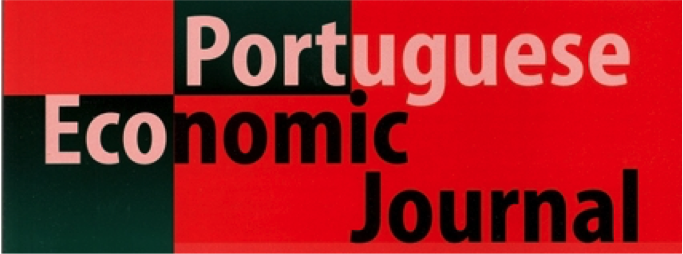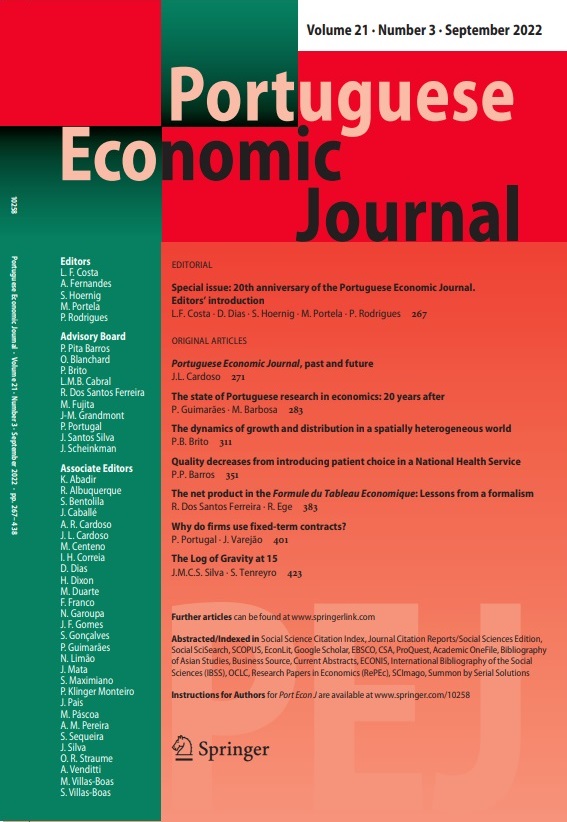By-Laws
Article 1
Name, ownership, and publishing
- 1. The Portuguese Economic Journal (PEJ) is a scientific peer-reviewed journal that features articles in the scientific field of economics. The first volume was published in 2002.
- 2. PEJ is owned by the Lisbon School of Economics & Management (ISEG) of Universidade de Lisboa (ULisboa), where it is based for mailing purposes. ISEG also supplies the human and financial resources necessary for the journal’s editorial organisation and operation.
- 3. ISEG of ULisboa assigns the responsibility for publishing PEJ to an international science publisher by contract.
Article 2
Aims and scope
- 1. PEJ aims to publish high-quality theoretical, empirical, applied or policy-oriented research papers on any field in economics.
- 2. A rigorous, fair and prompt refereeing process will be enforced.
- 3. The geographical reference in the name of the journal means only that the journal is an initiative of Portuguese scholars. There will be no bias in favour of particular topics and issues.
Article 3
Periodicity
- 1. PEJ is a triannual publication, i.e. three issues are published in each volume, which corresponds to a calendar year.
- 2. Exceptionally, one, two or four issues may be published in a given year.
Article 4
Editorial statute
- PEJ:
- 1. is a generalist journal, with regard to both the areas of economics and the type of approach: theoretical, methodological or applied;
- 2. declares a special, though not exclusive, focus on publishing studies concerning the Portuguese economy;
- 3. only publishes articles whose scientific quality meets international standards, which is ensured by a thorough refereeing process;
- 4. includes mainly articles spontaneously submitted by their authors. However, special issues may be published with articles by authors invited for that purpose or articles presented at specially organised symposia;
- 5. is completely independent of creeds, ideologies, institutions, people, and schools of thought. Authors are fully responsible for the opinions expressed therein;
- 6. is published in English.
Article 5
Governing bodies
- PEJ governing bodies comprise:
- a) the editor-in-chief;
- b) the executive board;
- c) the advisory board;
- d) the editorial board.
Article 6
Editor-in-chief
- 1. The editor-in-chief is responsible for coordinating the activity of the executive board and for representing the journal.
- 2. The editor-in-chief must be a professor of the Department of Economics (DoE) of ISEG of ULisboa, with a relevant curriculum of publications in international reference journals in the field of economics, and flawless ethical conduct.
- 3. The editor-in-chief is appointed by the Dean of ISEG of ULisboa, after consulting the advisory board of PEJ, the contracted publisher, the President of the Scientific Board, and the Head of the DoE. The mandate of the editor-in-chief lasts five years.
- 4. In the event that the mandate of the editor-in-chief expires in the six months immediately preceding or following the Dean’s taking of office, it is automatically extended for one year.
Article 7
Executive board
- 1. The executive board is responsible for the day-to-day management of the journal, namely with regard to:
- a) setting the editorial principles and acceptance criteria for articles to be published, choosing the referees, and deciding on articles submitted;
- b) editing the materials to be published in each issue, and ensuring that deadlines and legal obligations arising from publishing articles are met;
- c) regularly reporting information on the number of articles submitted, rejection rates, and turnaround times from submission to decision and publication;
- d) taking all actions necessary to keep the journal listed and referenced in the main international indexation systems, namely Econlit (JEL), Scopus, and Web of Science (ISI).
- 2. The executive board comprises the editor-in-chief and a minimum of four and maximum of six co-editors.
- 3. The executive board must not comprise a majority of or even half its members who are affiliated to the same institution.
- 4. The co-editors shall be chosen by the editor-in-chief. The mandate of the executive board coincides with that of the editor-in-chief.
- 5. In the event that the editor-in-chief becomes temporarily or permanently unavailable, the longest-serving co-editor shall take over as interim editor-in-chief until the former returns or a new one is appointed.
- 6. The members of the executive board may not publish articles in PEJ while in office. This prohibition does not apply to editorial notes.
Article 8
Advisory board- 1. The advisory board is responsible for issuing opinions and providing technical and scientific advice to the executive board, as well as pronouncing on the proposals for the position of editor-in-chief.
- 2. The advisory board comprises a minimum of four and maximum of thirteen advisors.
- 3. The advisory board must not comprise a majority of or even half its members who are affiliated to the same institution.
- 4. The advisors shall be chosen by the executive board.
Article 9
Editorial board- 1. Associate editors are responsible for collaborating with the executive board, namely with regard to:
- a) carrying out the editorial policy of PEJ by helping to promote and increase the visibility of the journal in order to attract high-quality article submissions;
- b) refereeing articles and nominating referees;
- c) taking every action that may contribute to strengthen the journal, both from a scientific and from an external visibility point of view.
- 2. The editorial board comprises the executive board, the advisory board, and a minimum of twenty four and maximum of forty nine associate editors.
- 3. The group of associate editors must comprise a majority of members who are affiliated to foreign institutions. However, it must not comprise a majority of or even half its members who are affiliated to the same institution, be it domestic or foreign.
- 4. The associate editors are chosen by the executive board, who may consult the advisory board for that purpose.

